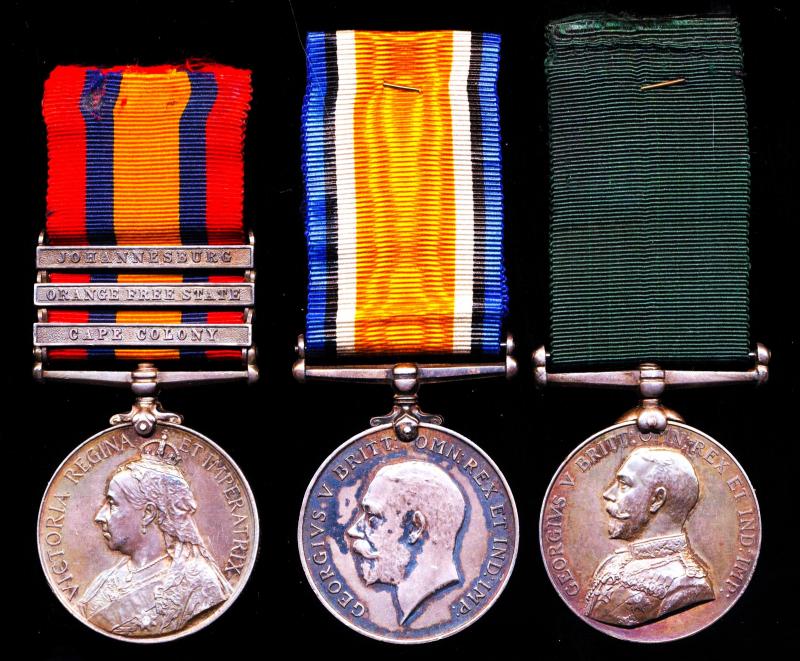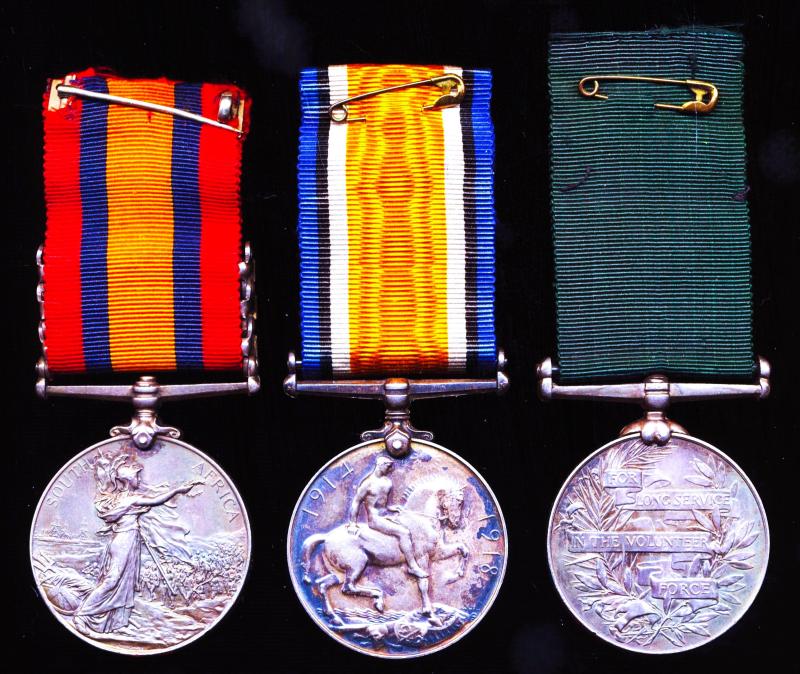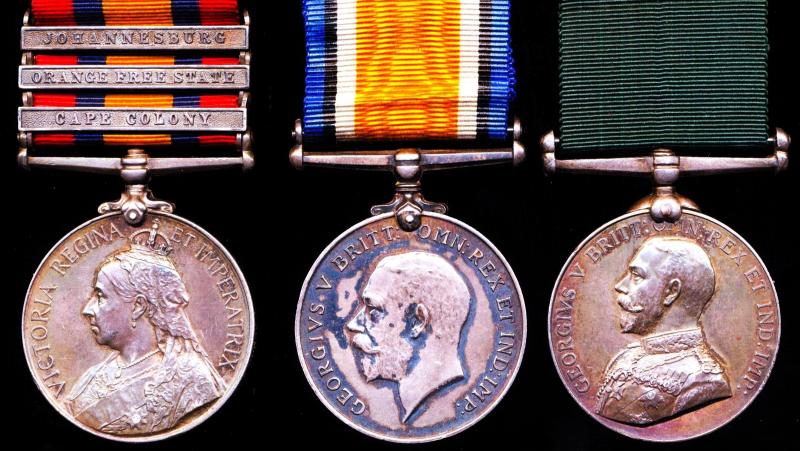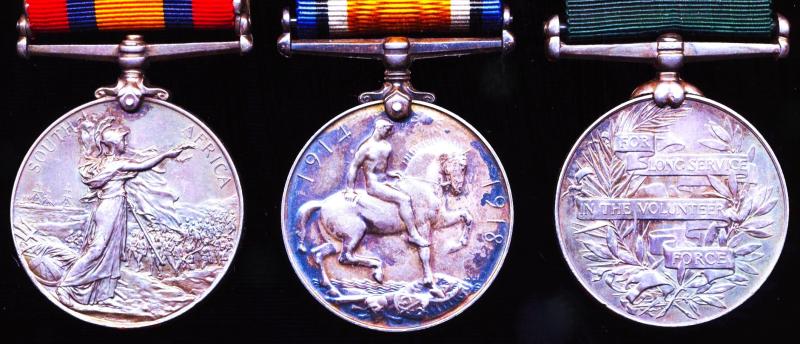A 'Tea Planter's' and India 'Volunteer's' South African War, Great War & Long Service medal group of 3: Captain Edward Byres Moir-Byres Assam Valley Light Horse, late Lumsden's Horse
- QSA. 'CC' 'OFS' 'Joh' (150 Tpr: E. B. M. Byres. Lumsden's Horse)
- British War Medal. Silver issue (Capt. E. B. Moir-Byres.)
- Volunteer Long Service Medal (India & Colonies). GV issue (Captn E. B. M. Byres Assam Valley Lt Horse.)
Medals & clasps verification: All medals and clasps are confirmed as entitled per the below following cited reference sources:
- QSA Medal & 3 x clasps: WO 100/258
- British War Medal. Silver issue: WO 329/2351 compiled & signed at India Office 29/06/1922
- Volunteer Long Service Medal (India): Indian Army Order No.292 of 1915, awarded 07/06/15
Reference 'The History of Lumsden's Horse - A Complete Record of the Corps from its Formation to its Disbandment (Pearce, 1903), Trooper E. B. Moir-Byres is confirmed as having served with 'B' Company No.1 Section of Lumsden's Horse. At the time of his enlistment his civilian occupation and address were recorded as, Tea Planter, Tarrapore Tea Co located at Cachar District, Assam, British India. Edward was not serving alone from amongst the volunteers who worked as Tea Planters in Cachar. The nominal roll of Lumsden's Horse show that, of the 32 x 'Other Ranks' who served in the same section as Moir-Byres, half of them, i.e., 16 x men, were all described as Tea Planters from Cachar
Cachar District: The Imperial Gazetteer' states that in 1904, the district had 164 x tea gardens with an out-turn of over 31,000,000 lb. (14,000 tonnes) of manufactured tea, which gave employment to 140 Europeans and 63,500 natives ..... The principal tea companies were the Tarapur, with its centre at Dawan, 18 miles (30km) east of Silchar; the Scottpur, centre Pollarbund, 11 miles east of Silchar; and the’Bengal Tea Company’ in ‘Hailakandi District Subdivision’(see below), centre Ainakhal
Edward Byres Moir-Byres, third son of George Moir-Byres (described variously as an Oil Manufacturer / Landed Proprietor) and Sophia Elenor Matilda Moir-Byres (nee Bulteel) was a native of, Manchester, Lancashire, England, where he was born on, 31 January 1873. By descent, the family had its ancient roots in Aberdeenshire, Scotland. Edward was one of seven children in the Moir-Byres family, his siblings being 4 x brothers and 2 x sisters. Edward still in his early twenties, obtained an appointment to work in British India on the Tea Estates of Assam, and from the mid 1890's, he was working in British India as a Tea Planter. He appears to have spent the best part of 30 years in India, during which time he fought in the South African War (Queens South Africa Medal with 3 x clasps), and was at some time mobilized during the Great War for internal security duty in India (for which latter service he earned the British War Medal). He was a long standing member of the Assam Valley Light Horse in which unit he latterly held the rank of Captain (and awarded the Volunteer Long Service Medal in 1915). During a furlough to the United Kingdom, Edward married Mary Vera Gibson, at Newcastle in 1912. Edward and Vera were subsequently blessed with 3 x children, 2 x daughters and a son. Their first born daughter Marie was born and sadly died in infancy in 1915 at Darjeeling. Their son George Francis Moir-Byres was born in London. in 1916 - and later became a professional soldier, serving latterly ending his career as a Major in the Gordon Highlanders, having been wounded during the Malaya Campaign 1941-42, and who had been Prisoner-of-War being transported to work on the 'Death Railway' in Thailand, where he was subsequently decorated with the award of a 'Mention-in-Despatches'. Edward's daughter Ann Moir0Byres, was born in Shillong, Assam in 1918. Prior to getting married, Edward had been the father of two boys, viz Thomas Jackson Byers (born Assam 1898) and William Byers (born Assam 1903). Edward Byres Moir-Byres, retired from the Assam Tea Estates sometime in the 1920's, and returned to the United Kingdom where he died on, 24 May 1926, at the Mundesley Sanatorium, located at, Ginningham, Norfolk, England
Shortly after the outbreak of the South African War, Edward was one of a number of a number of Assam 'Tea Planter's, who took leave of their employers and enlisted for overseas in the South African War, when they volunteered for service with the India raised 'Lumsden's Horse'
Lumsden's Horse, also known as Colonel Lumsden's Corps, was the name given to the Indian Mounted Infantry Corps, which was formed in Calcutta in 1899 by Lieutenant-Colonel Dugald McTavish Lumsden of the, Assam Valley Light Horse. The new corps was raised from volunteers from various existing Indian regiments, including the Assam Valley Light Horse. Colonel Lumsden contributed 50,000 rupees
The Corps left Calcutta 250 strong in February 1900, consisting of two squadrons and a maxim gun detachment. It was commanded by Lieutenant Colonel D M Lumsden, of the Assam Valley Volunteers; while Lieutenant Colonel Eden C Showers, Commandant of the Surma Valley Light Horse, went as second in command with the rank of Major. 'A' Company sailed from Calcutta on 26th February 1900, and 'B' Company on 3rd March. 'A' Company landed at Cape Town and 'B' at East London, and both joined the army of Lord Roberts at Bloemfontein in April. On the 21st Lumsden's Horse marched out of camp to join General Tucker's Division, which had been holding the hills won at the battle of Karee Siding, 29th March. They were attached to a mounted infantry corps commanded by Colonel Ross, which consisted of Lumsden's Horse 240, Loch's Horse 220, West Riding and Oxford Light Infantry MI 220, and the 8th Battalion Regular MI 420
On 29th April Ross received orders to make a demonstration against the Boer right, to draw them out, if possible, and allow Maxwell's Brigade to seize their position. Henry's Mounted Infantry were to co-operate. Lumsden's Horse occupied various spurs about 1500 yards from the Boer position; but the enemy moved out and took the offensive with vigour. Major Showers, who was exposing himself with rash bravery, was killed early in the action. So strong and determined was the enemy that Lumsden's men were ordered to retire. Lieutenant Crane, who with his section had been detached from Lieutenant Colonel Lumsden's command, did not receive this order. He and his men held on to the position which they were holding, and were cut off and captured. The casualties of the two squadrons in this their first engagement were most severe. Major Showers and 5 men were killed, and Lieutenant Crane and 5 non-commissioned officers and men were wounded. After the engagement, General Tucker complimented Lumsden's Horse, but 'rebuked' them for an exhibition of bravery which, he thought, bordered on rashness and the unnecessary courting of danger
On 3rd May Lord Roberts commenced his advance to Pretoria. During this movement Lumsden's Horse scouted and skirmished in front of the right centre of the great army. At the Zand River on the 10th, at Viljoen's Drift on the Vaal on the 26th, and near Elandsfontein on the 29th, Ross's Mounted Infantry, including Lumsden's, did well, and their work was much praised by various correspondents. During the advance, and particularly after the Vaal was crossed, Lumsden's men had several casualties
After the occupation of Pretoria, Lumsden's Horse were employed about Irene and at Springs, where they had the usual hard outpost work and some skirmishing. On 22nd July they marched into Pretoria and joined a force under Colonel Hickman, with whom they did some patrol work. About this time Lumsden's Horse left Colonel Ross, who issued an order in which he bestowed on them the highest possible compliments
About the beginning of August the corps, now under Brigadier-General Mahon and General lan Hamilton, started on a march to Rustenburg, thence to the country north of Pretoria, and back to the capital, which was reached about the end of August. At Zilikat's Nek there was stiff fighting, in which the Berkshire Regiment did very well
Mahon was now ordered to make a forced march to Carolina. He arrived there on 6th September in order to co-operate with French in the march to Barberton — a splendid effort on the part of all ranks
Lumsden's Horse next took part in the march from Machododorp to Heidelberg along with the other troops of Generals French and Mahon. After some very severe fighting Heidelberg was reached on 26th October, and the corps then marched to Pretoria
On 23rd November, 1900, Lumsden's Horse left Pretoria for India. Lord Roberts telegraphed to the Viceroy expressing his 'appreciation of their excellent services', and said: 'It has been a pride and a pleasure to me to have under my command a volunteer contingent which has so well upheld the honour of the Indian Empire'.
Men of Lumsden's Horse earned a number of orders and decorations for their services in South Africa including; 1 x C.B., 1 x C.M.G., 2 x D.S.O.'s & 6 x D.C.M's
The medals all retaining lengths of their original silk ribands. The QSA riband mounted with a contemporary white metal mounting brooch, that retains its hinged pin & clasp, and is as-worn by the recipient. The other medals having old safety pins attached
A most interesting and scarce medal group to a most desirable South African War 'Colonial' unit - 'Lumsden's Horse'
See the recipients miniature medals, and his son's full-size and miniature medal groups that are being offered separately for sale on this website
Condition: Medals dark toned GVF
Code: 24351







